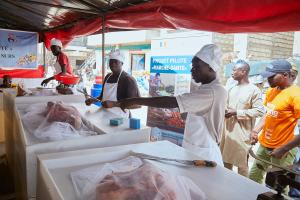‘Healthy Food Market’ programme bolsters food safety in Senegal
Dakar – Alioune Samb works as a butcher at the bustling Grand Dakar market in the heart of the Senegalese capital. “Before, we weren’t conscious of the potential dangers of our behaviours and the poor sanitation of the market,” he admits.
But since January last year, Alioune’s place of work has benefitted from a hygiene and sanitation project dubbed ‘Healthy Food Market’, which has helped to guarantee the food safety of foodstuffs and lure wary customers back in the process.
According to the World Health Organization (WHO), more than 200 diseases are caused by the consumption of food contaminated by bacteria, viruses, parasites or chemical substances such as heavy metals. This has a significant impact on public health in the African region, accounting for more than 91 million cases of illness and 137 000 deaths per year.
“Nutrition and food safety are closely linked. Unsanitary foods increase rates of infection and intoxication, creating a vicious circle of illnesses and malnutrition and particularly affecting vulnerable groups,” explains Lusubilo Witson Mwamakamba, Regional Food Safety Focal Point at the Who Regional Office for Africa.
The results of a recent national research study carried out in 69 Senegalese markets revealed severe deficiencies ranging from the lack of zoning of stalls, which leads to the mixing of products with different levels of sensitivity and the associated risk of cross-contamination; to the insufficiency or non-maintenance of toilets, which mostly lack running water; to the sale of food on uncovered stalls or even on the floor.
The study concluded that the absence of water points, the lack of regular waste removal services, and the scarcity of cold storage equipment, particularly for highly perishable foodstuffs such as meat and fish, encourage the proliferation of microorganisms that can cause disease. "The unsanitary conditions caused by these failures could constitute a real danger to public health," it reads.
Senegal’s Ministry of Health launched the Healthy Food Market project in response to these findings, with support from WHO, with the pilot phase starting at the Grand Dakar market.
The project consists of providing markets with facilities and equipment and encouraging compliance with basic food hygiene rules in order to prevent foodborne diseases. "From now on, it is required to wear aprons, obtain a medical certificate and each seller must have a dustbin," says Mame Diarra Faye Leye, Focal Point of the International Food Safety Authorities Network (INFOSAN). “We have worked on sanitizing places where poultry is sold, installing hand washing devices inside the market and raising awareness among users, who have become more exacting.”
There have already been notable changes since the start of the pilot project. “The training that we received has allowed us to improve our practices and we have also become more aware of the risks. With the presence of dustbins, there is no more waste next to products for sale and the stalls are better maintained,” says Alioune, the butcher.
Fatoumata Diakhaté is among the clients that have been attracted by the new provisions put in place. “I used to prefer to buy meat at major supermarkets because here [in the Grand Dakar market] there was no hygiene and any fridges that were in use were in a bad state. But now I buy from the market sellers because they are applying the hygiene rules. The products are well maintained and protected. There have been a lot of changes recently,” she says.
According to Alioune, these changes have had a tangible impact on vendors’ revenue: “Our sales have improved because the better cleanliness encourages more customers to buy our products,” he says.
“Improving hygiene conditions in markets will have a positive impact on the quality of food sold. People, especially those with fewer means, will be able to consume food from these markets in complete safety. This will contribute to the preservation of their health and reduce health costs,” says Professor Amadou Diouf, President of the National Committee of Codex Alimentarius (CNCA). “Traders will also be able to increase their income, which in turn will improve their living conditions and well-being.”
In addition to supporting the implementation of the pilot project, WHO is helping Senegal to strengthen its national food safety system through the implementation of the Global Strategy for Food Safety recently adopted by WHO. After a year of implementation of the Healthy Food Market project in Dakar, Senegal plans to expand the interventions to other markets across the country.
Communications Officer
Regional Office for Africa
Email: lawsonagbluluf [at] who.int (lawsonagbluluf[at]who[dot]int)
Chargée de Communication
OMS Tchad
Email : coumbalay [at] gmail.com (coumbalay[at]gmail[dot]com)
